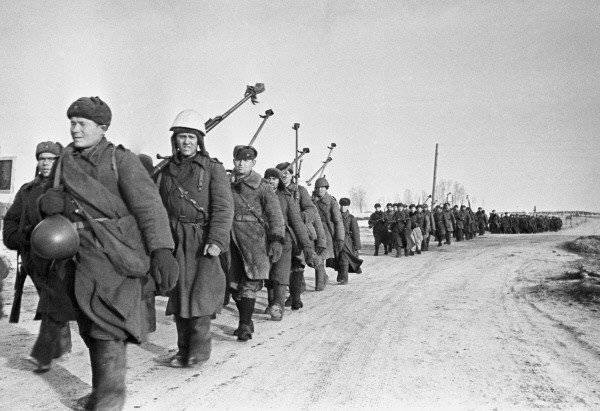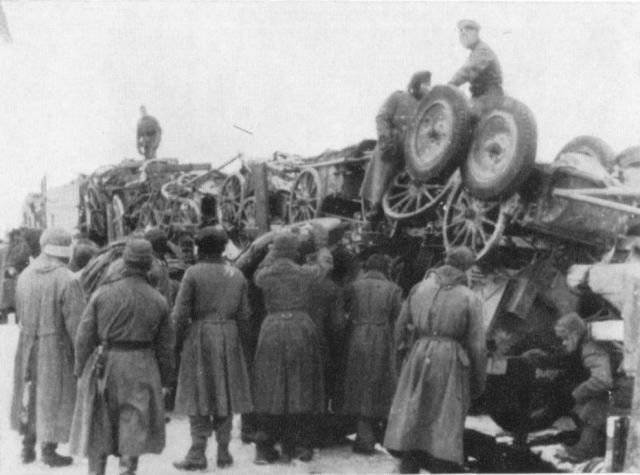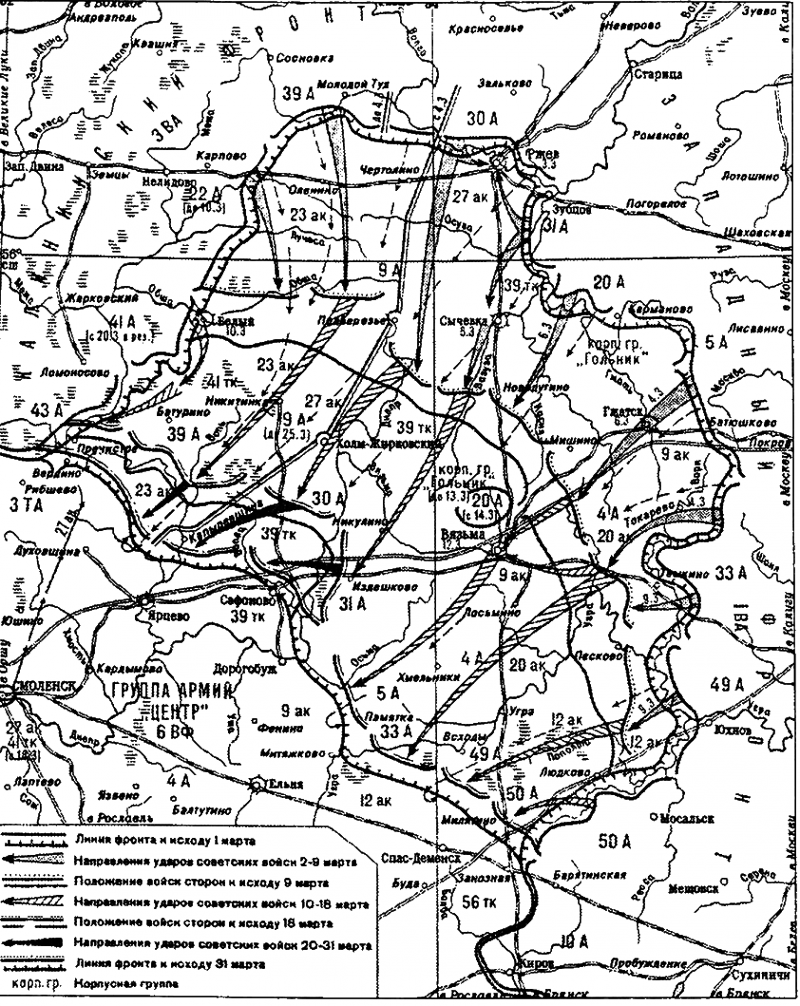Operation Buffel. To the 70 anniversary of the end of the Battle of Rzhev

By the beginning of March 1943, in the situation on the Soviet-German front, significant changes occurred. The strategic initiative passed to the Soviet troops. After the victory in the Battle of Stalingrad, our troops launched an offensive on many sectors of the front from Leningrad to the North Caucasus. The German command was forced to clear the Caucasus, part of their grouping retreated to the region of Rostov-on-Don, the other - to the Taman Peninsula. The Voronezh and Bryansk fronts conducted successful Ostrogozhsk-Rossoshansk and Voronezh-Kastornoye operations in the Upper Don. Soviet troops defeated the main forces of Army Group B, and liberated a large part of the Voronezh and Kursk regions. The troops of the South-Western and Southern fronts defeated the German troops in the Donbas and Rostov directions.
However, in the western sector of the front, the German command remained in the hands of the powerful Rzhev-Vyazma bridgehead, which was still occupied in the 1941 year. The line of the Soviet-German front here was west of White, north-east of Rzhev, west of Yukhnov and east of Spas-Demensk. This ledge was still a potential springboard for a strike on Moscow. Therefore, in 1942, the Soviet troops repeatedly tried to eliminate it. "Rzhevskaya meat grinder" has become one of the bloodiest battles of World War II.
The Germans created the strongest defensive line on this bridgehead, which the Red Army unsuccessfully tried to break through several times. On the ledge, which had 160 km in depth and up to 200 km along the front, the German command concentrated about two-thirds of the German Army Group Center. This forced the Soviet command to keep on the Rzhev direction to 12 combined arms and 2 air armies of the Kalininsky and Western fronts, which hampered our significant forces, prevented to organize active offensive actions in other directions.
Operation Buffel (Buffalo)
In mid-January, 1943, the Soviet troops liberated the city of Velikie Luki, which increased the threat of the encirclement of the German group on the Rzhevsky ledge. The defeat of the German troops at Stalingrad and in the Caucasus also played a role. 6 February 1943 of the year, after repeated appeals from the leadership of Army Group Center and the Chief of Staff of the Ground Forces General Kurt Zeitzler, Adolf Hitler gave permission to take the 9 and part of the 4 army to a previously prepared defense line, along the line Dukhovshchina - Dorogobuzh - Spas -Demensk.
This operation was called “Buffel” (it. B --ffel - buffalo), or “Buffelbevegung” - “Buffalo Movement” and “Buffelstellung” - “Buffalo Position”. Its main tasks were to level the front line in order to prevent the encirclement and defeat of the 4 and 9 armies, and the release of the divisions for reserve. The commander of the 9 Army, Colonel-General Walter Model, was appointed to be in charge of the operation "Buffalo".
The headquarters of the 9th Army prepared this operation a few months ago. The staff of the 9th Army were well aware of the danger of the stubborn defense of the Rzhevsky ledge. At any moment, enemy numerical superiority or tactical failure could lead to disaster. And the task was very large-scale, it was imperceptible for the enemy to withdraw 24 divisions, in total about 322 thousand soldiers and officers, plus a certain number of Russian collaborators, civilians. The 9th Army’s artillery and anti-tank fleet exceeded 400 guns, tank divisions had about 100 units of armored vehicles. In addition, it was necessary to ensure that the withdrawal did not turn into flight.
A special headquarters was established at 9 for the leadership of the operation. All army sappers, builders and teams of prisoners of war were subordinated to the head of the engineering service.
The plan of the operation included a large preparatory work:
- The Germans had to equip a new line of defense, prepare separate defensive positions for retreat. A new defensive line was built between Velizh and Kirov. In this area, the main infantry, artillery and anti-tank positions were urgently erected, the approaches and shelling zones were cleared. At the end of the preparatory period, each division sent a liaison team under the command of one of the senior liaison officers and sappers to check the area allocated to it. In each division, small working parties were created, mainly from the rear men and vacationers. These parties had to check everything and take responsibility for the new line of defense.
- Clear the army more than 100 km in depth;
- To facilitate the evacuation of troops and weapons, build a new 200 km highway and 600 km road for sledges and horse-drawn vehicles.
- Evacuate military equipment, economic good (machines, tools, grain, livestock, etc.). In particular, artillery guns, which could not be removed using horse-drawn and motorized vehicles, were delivered to a new line of defense by rail. The guns were partially dismantled. At the forefront, they tried to leave only captured guns that were not a pity to throw and destroy during the retreat. In addition, all food supplies were removed from the population. Many settlements were destroyed, wells were poisoned. The model used the scorched earth tactics. Therefore, the USSR declared the general a war criminal.
- Take out for the new defensive line more than 60 thousand civilians. Soviet citizens were sent to forced labor to build defensive lines. In addition, they wanted to avoid sabotage and sabotage during the preparatory period of the operation and the operation itself. The model ordered the evacuation of the entire male population of military age from the Rzhevsky bulge.
- It was ordered to collapse, so as not to get the enemy, 1000 km of railway track and 1300 km of wires, and also to lay 450 km of cable lines. In addition, military and civilian objects were subject to mining and liquidation.
- 9-I army before the withdrawal of troops conducted a large-scale anti-partisan operation. Although the Rzhevsky salient was saturated with German troops, a significant number of Red Army soldiers were still hiding in wooded and swampy areas, who were cut off and lost during various offensives of the Soviet army. So, in February 1943, the 9 Army Intelligence reported that, up to 12, thousands of Soviet soldiers could strike at the retreating German columns. Therefore, parts of the 39 tank corps conducted a 2 weekly sweep of suspicious areas. Combinations of the SS cavalry division, four army divisions, small SS units, police and collaborators were also attracted to the operation. According to the reports, 3 of thousands of “partisans” were destroyed (many were unarmed, therefore their belonging to organized resistance is doubtful). 16 small-caliber guns, 17 mortars, 9 anti-tank guns, 61 machine guns and other weapons were found.
A typical case of fighting “partisans” is told by the corporal of the 4 Panzer Division: “... our patrol detained the old man and the 6-year-old boy with a supply of salt and potatoes. They said that they were going to fish ... We did not hold them for long and almost immediately released them. To heaven. Personally, I was not lucky enough to shoot someone, but I will do it with a smile ”(Newton S. Hitler’s Fireman - Field Marshal Model. M., 2007).
The preparatory activities tried to be carried out in secret. So, loading of railway echelons and evacuation of the population and weapons, tried to carry out at night. By order of the Model, it was forbidden to use the name of the operation in telephone conversations. 28 February 1943, the commander of the 9 Army, designated the start of Operation Buffalo on the 19 of the March 1 watch. The rearguard had to leave the leading positions and Rzhev in the 18 of the 2 hours of March.
When the start date for the withdrawal of troops approached, the special headquarters divided the rear of the 9 Army into three large sectors. The headquarters was also divided into three divisions. Each unit had to control all movements of transport and foot columns. The headquarters of each sector was headed by the commander of an infantry regiment, and engineers, artillery officers, and communications operators were subordinate to him. Everyone had their own job site. Corps and divisional commanders received tough orders to submit to the sector headquarters.

Course of operation
In 19 hours 1 March 1943, the German troops began to retreat to the previously prepared positions. At the front line, only the rear guard troops remained. In the evening of March 2 the Germans left Rzhev. Before the sapper left, they destroyed the bridge across the Volga.
5 - 7 March The Germans held a defensive line along the Sychevka - Bely line. In the forests of Sychevka, despite the anti-partisan operation, the Wehrmacht encountered active resistance from the partisans who attacked the retreating enemy columns, and also destroyed the telephone lines. March 8 Wehrmacht left Sychevka, March 10 - White, and March 12 - Vyazma. By March 14, the main forces of the German army were withdrawn to the Buffel position. 9-I army retreated without serious losses and retained almost all the equipment. In combat contact with the Soviet advanced units entered only cover units.
In the middle of March a thaw began, which slowed down the movement of German troops. The final evacuation of the German forces was completed on March 30 of 1943. In addition, in the second half of March, the Wehrmacht successfully repelled the attacks of the 1 and 5 of the Soviet tank corps, which attempted to surround the enemy in the area of Spas-Demensk and Yelnya.
Actions of the Red Army
The Soviet command was also not asleep and was developing plans to eliminate the enemy grouping. 6 February 1943 of the Year The Supreme Command issued directive No. 30043, where it was intended to “cut off” the Rzhevsky bulge, with the release of Soviet troops to the rear of the enemy. The main forces of Army Group "Center" wanted to surround and destroy. The headquarters decided to conduct an Rzhev-Vyazma offensive operation in March 1943. The forces of two fronts were supposed to take part in the operation: Kalininsky (commander Maxim Purkaev) - 22, 39, 41 and 43, 3 and Western Army (Commander Vasily Sokolovsky) - 5 , 10-I, 20-I, 30-I, 31-I, 33-I, 49-I and 50-I armies, 1-I air army. The total number of troops - about 870 thousand people.
February 18 and February 23 intelligence of the Western and Kalinin fronts reported on the preparatory work in the German rear. Soviet intelligence officers found that the German troops began to retreat to the west, heavy artillery pulling closer to the roads, and fortifications are preparing to undermine. Despite intelligence reports, the Soviet command was unable to respond promptly to the retreat of the German forces. Only in 14: 30 2 of March, the commander of the 30 army Vladimir Kolpakchi, having received data from the army intelligence on the withdrawal of German troops, ordered the army to go on the offensive. A little later, on the same day, the directive of the Supreme High Command Headquarters No. 30062 appeared, where the formations of the Kalinin and Western fronts were ordered to immediately begin the pursuit of the Nazi troops.
In the morning of March 3, without a fight, the Soviet troops occupied Rzhev. March 4, Soviet soldiers liberated Olenino, March 5 - Gzhatsk, March 8 - Sychevka, March 10 - White, and March 12 - Vyazma. The offensive of the Soviet troops was complicated by minefields, destroyed communications, well-prepared defensive positions of the enemy, which kept the rearguard troops. As a result, the rate of movement of the Red Army was low - 6-7 km per day.
In the second half of March, 1943 and 1 tank corps tried to surround the German forces in the area of Spas-Demensk and Yelnya. The command of the Western Front accepted the withdrawal of the troops of the “Center” group to a new frontier for the weakness of the enemy, and tried to build on the success without thinking through all the details of the operation and without making appropriate preparations. Attacks of the 5 Army, reinforced by the 49 and 1 tank corps and the 5 artillery division, were thrown on the offensive. However, the tank corps and artillery division were not fully staffed, the command could not establish their combat interaction between themselves and parts of the 14 army.
In addition, the enemy has already organized a powerful defense. So, before the front of the 1 tank corps defended 4 infantry divisions (in two echelons). German positions were saturated with firing means, including mobile firing points - tanks. The Soviet troops met a developed system of engineering and defense facilities, which included trenches, pillboxes, dugouts, escarpments and rubble. The offensive made it difficult to start the thaw.
Therefore, the offensive developed under the unfavorable scenario for the Soviet troops. Soviet tank brigades with submachine-gunners from motorized rifle battalions mounted on tanks went into the attack. But tank units, deprived of artillery support, suffered heavy losses. They made their way into the depths of the German positions, capturing the planned positions, but German artillery cut off the Soviet infantry that followed the tanks. Then the German artillery brought down a blow on the tanks that had come out ahead, and by the end of the day they were forced to retreat to their former positions. The 14 Artillery Division did not have projectiles to fight the counter-battery with the German artillery. Thus, the determination and dedication of tankers, their offensive outburst and initial successes were negated by the lack of adequate support from rifle and artillery formations.
But after several days of stubborn fighting, the Soviet troops suffered significant losses. The offensive was stopped. March 22 The Red Army reached the line Dukhovshchina-Dorogobuzh-Spas-Demensk, where the main forces of Army Group Center were entrenched. Having met the powerful defenses of the enemy, as well as the withdrawal of troops from the supply bases, which reduced the supply of ammunition and food, the Red Army completed the offensive by March 31.
Results
- The German command has solved the tasks. The troops were successfully redeployed to pre-prepared positions. The Wehrmacht lost more than 15 thousand people killed, wounded and missing. For use in other areas were released: 1 army headquarters, 4 corps headquarters, 15 infantry, 2 motorized, 3 tank and 1 cavalry divisions. Hitler and OKH had the opportunity to use these forces to conduct a major offensive operation in order to intercept a strategic initiative.
- The Rzhevsky bulge was liquidated, which was a danger to Moscow. The front line was reduced from 530 to 200 km. Soviet troops liberated Rzhev, Sychevka, Gzhatsk, Bely, Vyazma. The Wehrmacht was moved away from the Soviet capital on 100 — 120 km. At the same time, the Red Army suffered heavy losses in attempts to disrupt the systematic withdrawal of German troops and in battles with German cover units: more than 138 thousand people (of which about 39 thousand dead). However, the Soviet command, like the German, was able to withdraw some of its forces to the reserve.
Thus ended one of the bloodiest and fierce battles of the Great Patriotic War - the Battle of Rzhev.

Information